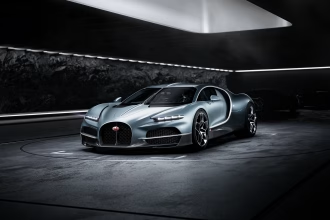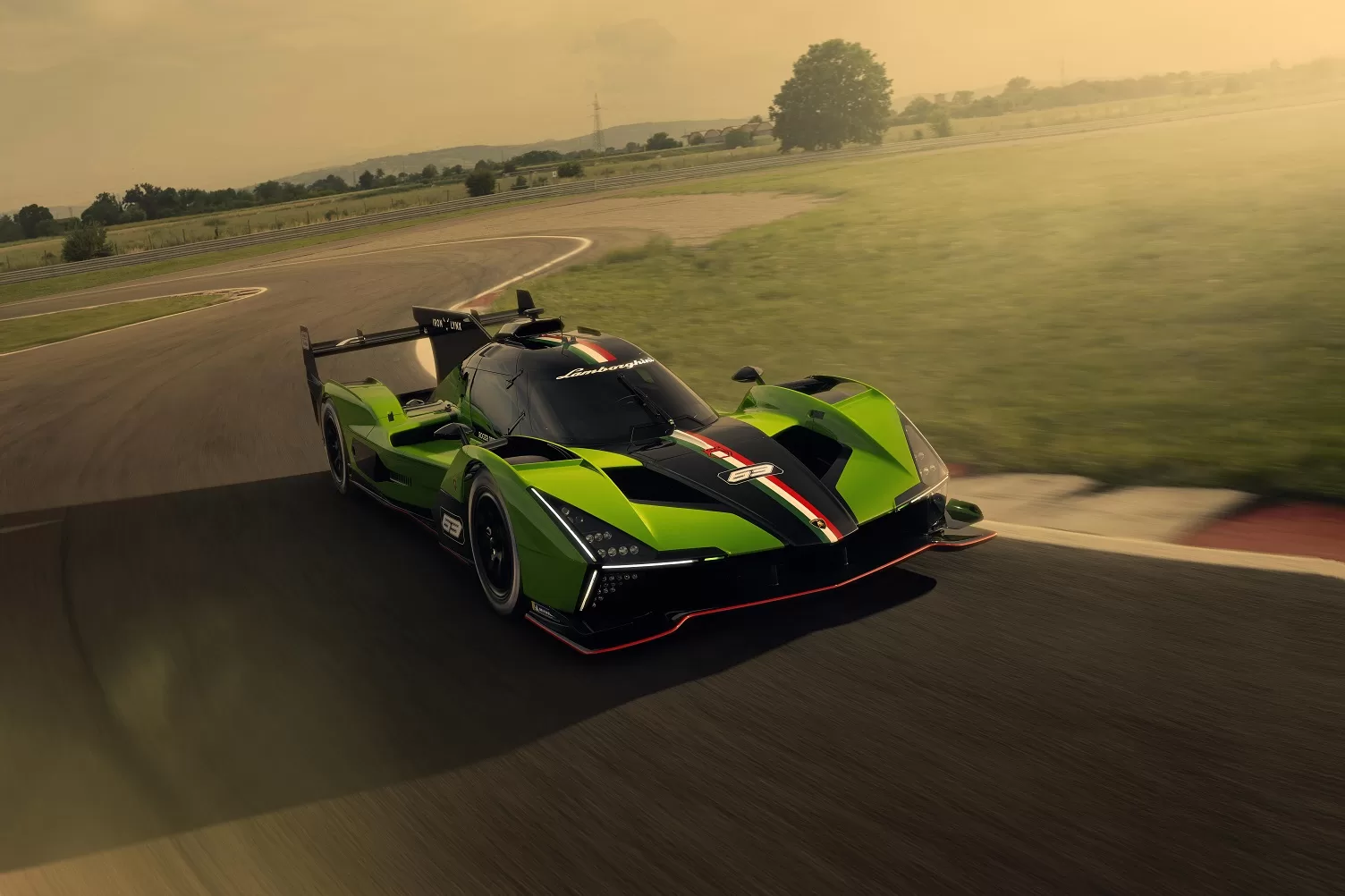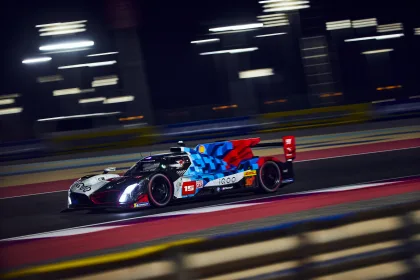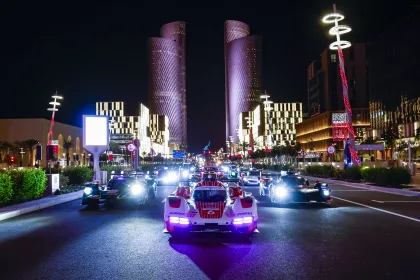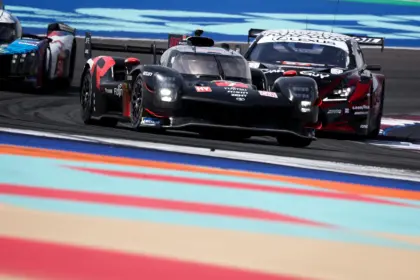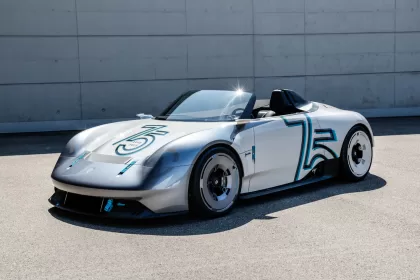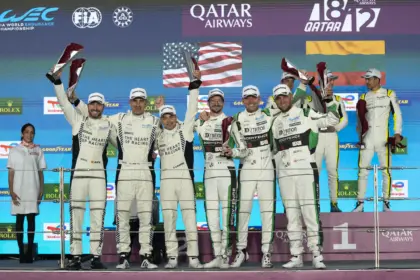Lamborghini Squadra Corse today launches its first hybrid endurance racing prototype, the SC63, at Goodwood Festival of Speed. The SC63, which will begin testing within weeks, is set to compete in the Hypercar class of the 2024 FIA World Endurance Championship, including the 24 Hours of Le Mans, and in the GTP class of the IMSA WeatherTech Sports Car Championship Endurance Cup, comprising classic races such as the 24 Hours of Daytona and 12 Hours of Sebring. Lamborghini has partnered with Italian team Iron Lynx to run the car in international competition and has signed world-class drivers from the world of Formula 1 and endurance racing.
The LMDh project represents a new concept of racing and fits the Direzione Cor Tauri strategy presented in 2021: a roadmap for electrification leading the company to hybridize the entire model range by the end of 2024 enhancing driving emotions and performances at the same time. Thanks to the SC63 this approach has been applied also to the motorsport programme representing a new pillar of the Lamborghini Manifesto: Driving Humans Beyond.
“The SC63 is the most advanced racing car ever produced by Lamborghini and it follows our roadmap ‘Direzione Cor Tauri’ laid out by the brand for the electrification of our product range,” says Stephan Winkelmann, Lamborghini Chairman and CEO. “The opportunity to compete in some of the biggest endurance races in the world with a hybrid prototype fits with our vision for the future of high-performance mobility, as demonstrated for road legal cars with the launch of the Revuelto. The SC63 LMDh is the step into the highest echelons and into the future of motorsports for our Squadra Corse.”
The SC63 features an all-new 3.8-liter twin turbo V8 engine that has been developed by Lamborghini engineers specifically for the racing program. The engine is a ‘cold V’ configuration, meaning that the turbos are mounted outside the vee angle of the engine which makes them easier to cool and to service. Furthermore, the ‘cold V’ solution lowers the mass and optimizes the car’s centre of gravity. This solution, combined with a specifically developed aero balance and attitude, has been identified as the most effective to achieve the best tyre grip, and perfect balance, drivability and consistent speed both over a single lap but also across long distance races.
Power from the engine and the hybrid system, which is standard across the LMDh-category cars, is limited by regulation to 500kW (680 CV). The Power Unit is managed by a Bosch electronic control unit. The LMDh rule set specifies a standard gearbox, battery and motor generator unit (MGU), which helps to contain the development costs for the prototype.
Under the skin, Lamborghini engineers have been able to exert their influence over all aspects of the car. Although the gearbox is standard across all LMDh cars, there is still freedom to customise it to a brand’s requirements including the selection of the gear ratios and the slip of the mechanical differential.
“Motorsport is, to us, also a valuable and demanding proving ground for our technology,” states Rouven Mohr, Lamborghini Chief Technical Officer “Our LMDh car, the Lamborghini SC63, is an exciting challenge from both a technical and a human standpoint. The development of our internal combustion engine, aerodynamically efficient bodywork and the overall technical package is a process that has pushed us to constantly raise our own standards. Now, it is time to put the wheels in motion, literally, on track in order to be ready and competitive for the 2024 season. As we develop our LMDh car, we are also mindful of the technology transfer opportunities. We will take our learning experiences from motorsport and apply them where possible to our future production cars.”
Lamborghini has selected renowned experts Ligier as its partner to develop and build the monocoque. As the first manufacturer to select Ligier on an LMDh project, there was freedom for Lamborghini to specify its requirements, including the development of the push rod front suspension design, overall weight distribution and ease of service for critical parts of the car. The bellhousing, which fills the gap between the rear of the engine and the front of the gearbox, positively affects torsional stiffness, and has been designed to house the electric engine.
Another key aspect of development is the braking system, which must deliver the highest level of performance and reliability in all conditions. Endurance racing places a lot of stress on the brakes and the first target has been to find a compromise between weight and durability, effective cooling, and also a system that is able to accommodate different styles of driving.
The bodywork has been designed by Lamborghini’s Centro Stile design department, in conjunction with the race design team. It features very clear brand styling cues throughout the car, including the iconic y-shaped lights at the front and rear.
“From the beginning, my personal briefing to the design-team was that the car needs to be highly functional, but we wanted to create a car that is immediately recognizable as Lamborghini,” says Mitja Borkert, Lamborghini’s Head of Design at Centro Stile. “The main recognition of the front and rear of the SC63 is driven by the y-shaped signature light. The size of the cabin and the main character of the car is driven by the sporting rules, but we have also implemented our own brand styling cues throughout the car. Integrated into the side panel of the body you can see a NACA duct that was inspired by the air intake of the Countach. When you look at the rear wheel arch, we gave the impression of acceleration towards the front, and this relates to the wheel arch design language of Lamborghini that can also been seen on the Revuelto.”
The cars will be dressed in a familiar livery, in keeping with the branding seen on the Huracán GT3 challenger. The SC63s will run in Verde Mantis green, with a black Nero Noctis strip over the cabin, front hood, carbon diffuser, rear fin and wing. The cars will also feature green, white and red Italian Tricolore colours, and will carry the branding of long-time partner of Lamborghini, Swiss watch manufacturer Roger Dubuis.
The cooling layout for the car has decided much of the engineering and design. For example, air intakes into the sidepods behind the cockpit underwent several iterations before a final design was settled upon. The team has incorporated eight different radiators including two intercoolers, one gearbox radiator, one condenser for the air conditioning, one radiator for the Energy Recovery System (ERS), one for the Energy Storage System (ESS) and two water radiators.
One of the limitations of the regulation is that there is only one body kit configuration allowed, and changes that teams are allowed to make to that kit race-to-race are limited. The design team therefore has to take into account the worst-case scenario, such as high ambient temperatures, and manage the thermal efficiency of the car at both IMSA and WEC circuits.
The SC63 has been designed and developed to offer the widest ‘operating window’ possible, to optimize performance while also being able to look after its tires even on the most aggressive track surfaces. Ahead track testing, intense development work has been carried out in the virtual world using a Driver in the Loop (DiL) simulator.
Further help has come from the Lamborghini factory drivers Mirko Bortolotti and Andrea Caldarelli, together with new drivers Daniil Kvyat and Romain Grosjean. The latter two have recent race experience of hybrids in Formula 1 and have been able to help the engineers to tune the LMDh system, in particular design the steering wheel controls to allow the driver to control the necessary functions of the hybrid system.
“This year marks not only the 60th anniversary of our brand, but also the tenth anniversary of Squadra Corse, Lamborghini’s motorsport division,” says Giorgio Sanna, Lamborghini’s Head of Motorsport. “Over the last decade we have achieved great results. Starting from scratch we have won some of the most prestigious endurance races in the GT category for our production-based racing cars. These include three class wins at the 24 hours of Daytona, and two wins in a row at the Sebring 12 hours. Now we are ready for what is our biggest step into the future of motorsport, measuring ourselves against the best manufacturers in the world.”
Starting in 2024, one car will compete in the full FIA World Endurance Championship. The second car will race in the North American Endurance Championship races of the IMSA series. The Iron Lynx team, presented as a partner at the 2022 Lamborghini Grand Finals, will run the cars in both series, and the driving line up will include Bortolotti, Caldarelli, Grosjean and Kvyat. Other drivers will be confirmed later in 2023.
Iron Lynx Team Principal and CEO, Andrea Piccini, said: “Being involved in such an ambitious project is a once in a lifetime experience. We are honoured and extremely excited to be part of it and to start a new chapter for Iron Lynx with Lamborghini. It’s been amazing to see everything finally come together for the reveal of the SC63. Everyone at Iron Lynx is eager for testing to get underway. This is undoubtedly one of the biggest challenges we’ve ever faced as a team, and we are now looking forward to seeing the SC63 on track.”




